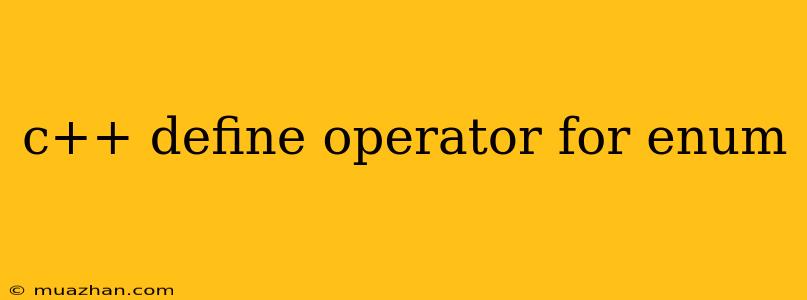Defining Operators for Enums in C++
Enums in C++ are a great way to represent a fixed set of named constants. However, sometimes we need to define custom behaviors for enums, such as performing arithmetic or comparison operations. This is where defining operators for enums comes in.
Why Define Operators for Enums?
Defining operators for enums provides several advantages:
- Code readability: Using operators makes the code more readable and intuitive. Instead of using if-else statements to compare enum values, we can use comparison operators like ==, !=, <, >, etc.
- Code conciseness: Defining operators eliminates the need for repetitive code and simplifies complex operations.
- Encapsulation: Defining operators allows us to control the behavior of enums and encapsulate their logic within the enum class.
Defining Operators
We can define operators for enums by overloading them as member functions or as non-member functions.
1. Overloading Operators as Member Functions:
enum class Color {
Red, Green, Blue
};
// Overloading operator+ for Color enum
Color operator+(Color color1, Color color2) {
int combinedValue = static_cast(color1) + static_cast(color2);
if (combinedValue >= 3) {
combinedValue %= 3;
}
return static_cast(combinedValue);
}
int main() {
Color color1 = Color::Red;
Color color2 = Color::Green;
Color combinedColor = color1 + color2; // Using the overloaded operator+
// ...
}
In this example, we overload the operator+ to define addition behavior for Color enum. It converts the enums to integers, performs the addition, and then converts the result back to the Color enum.
2. Overloading Operators as Non-Member Functions:
enum class Direction {
North, South, East, West
};
// Overloading operator== for Direction enum
bool operator==(const Direction& dir1, const Direction& dir2) {
return static_cast(dir1) == static_cast(dir2);
}
int main() {
Direction direction1 = Direction::North;
Direction direction2 = Direction::South;
bool areEqual = direction1 == direction2; // Using the overloaded operator==
// ...
}
Here, we overload the operator== as a non-member function to compare two Direction enums. It converts them to integers and performs a comparison.
Important Considerations:
- Choose appropriate operator types: Ensure that the chosen operators are relevant to the enum's purpose.
- Handle edge cases: Consider all possible scenarios and handle them appropriately, especially when dealing with overflow or undefined behaviors.
- Maintain consistency: Define operators consistently across the enum class.
Conclusion
Defining operators for enums in C++ offers a powerful way to enhance code readability, conciseness, and encapsulation. By carefully choosing appropriate operators and handling edge cases, we can make our code more efficient and expressive. Remember to prioritize clarity and maintain consistency throughout the codebase.
